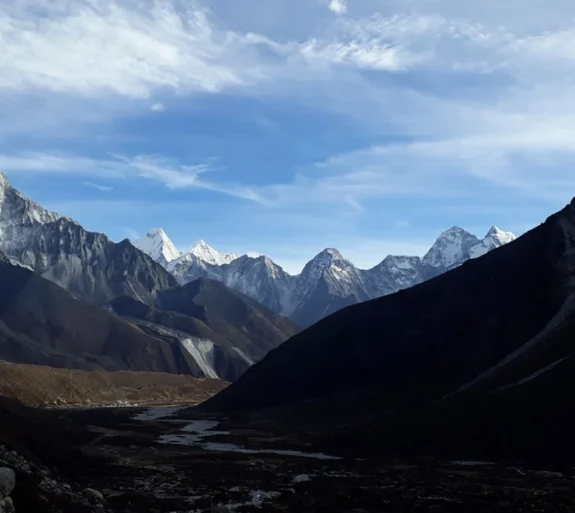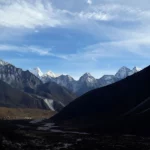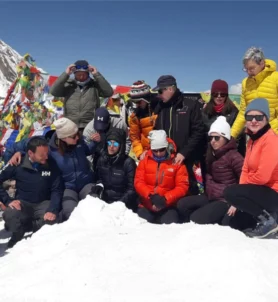Annapurna Everest Base Camp Trek Package
We cater budget, standard and full fledged trekking package to Annapurna and Everest Base Camp Trek. What included and what excludes in the trip package, it depends on the price we offer while booking the trip.
ABC EBC Trek Difficulty
Everest Base Camp is a challenging grade trek to EBC and Kala Pattar. Some previous trekking experience is helpful. If you do not take part in regular exercise or hill walking then you should do some physical preparation beforehand. The maximum altitude of EBC trek is 5,545 m and an average is approximately 3,900 m. Ample time is given for acclimatization, but altitude is a factor. Walking hours stated in the itinerary are given as approximates only. Timings stated exclude lunch stops and will vary depending on the pace of your group.
EBC and ABC Trek Accommodation
You will get tea house accommodation along the trail. The lodges are very simple with basic facilities. You will get twin-sharing bedrooms throughout this trek. Beds with foam mattresses, bed sheets and a pillow are provided. Bedrooms are unheated and cold at night so you will need to bring a sleeping bag. Most lodges have only one or two basic toilets and sometimes these are located outside the main lodge building.
Toilets-Toilets are usually Asian ’squat’ style; although many lodges have now installed ‘western style’ seated ones. Toilet paper is not provided so you should bring your own or buy it locally (please dispose of it in the bin provided – do not put it in the bowl). If there is not a flush handle, there should be a container of water to pour down – if it is empty (or frozen) please either refill it or ask the lodge too.
Hot Shower-Mostly lodges have hot ‘showers’ charged at approx. Rs 250-Rs 500 per shower. Sometimes a hot shower is simply a bucket of hot water and not a shower head. As a general rule, the higher you go to, the lodges are more basic and the more expensive food and services become. However, we discourage our groups from using water heated by wood as a lack of firewood in villages is a big environmental concern in Nepal. Access to electricity points for charging devices will cost extra. Wi-Fi is available at some locations, but connections may be poor.
Food on Trek around Annapurna and Everest Base Camp
The three times meals-Breakfast, Lunch and Dinner are included in the package cost. There are a choices of eating options. Your guide will be able to suggest food items during your trip. The menus in the tea houses are varied, ranging from traditional Nepalese Dhal Bhat to pizza and apple pie. Vegetarians are well catered in Nepal.
Breakfast-Breakfasts will usually be Asian style consisting of noodles or rice porridge or bread and eggs. Vegetarians will be able to find a range of different foods, although in some areas the choice maybe limited. Although meat is available in the tea houses, we advise you not to eat meat on the trek. The meat has often been carried in heat from lower altitudes for several days before reaching the lodges. So, meat can cause stomach upsets or illness. Germs can also be spread by handling dirty money – we recommend using hand sanitizer.
Lunch and Dinner-During a tea house trek you will usually have breakfast and dinner same tea house where you spend night, lunch will be eaten at one of trail side restaurants. Every tea house serves traditional Nepali meal Dal Bhat (rice and lentils), as well as a variety of different food items such as rice, vegetables, noodles, potatoes and soup. Some have Nepali versions of western food such as pizza, pasta and french fries. Soft drinks, snacks and beer are available in most of the tea houses and trail side restaurants. And, of course, Nepali milk tea is served everywhere. All tea houses have boiled water for trekkers. We discourage the purchase of bottled water while on the trail. The plastic bottles are difficult to dispose off and have become an environmental problem.
WiFi and Internet Access
Hotels in Kathmandu generally have excellent WiFi connections. Most hotels offer free WiFi in public areas. While trekking WiFi may be available in tea houses and lodges for a small cost.The higher you go the use of WiFi and internet will be extra cost and likely the slower the speed. Your tour leader will be able to offer some advice on communications in remote areas of the country. Please note that most tea houses do not have electrical outlets in rooms to charge devices but are shared in the main dining area with an additional cost. Past travelers have found portable solar chargers to be very useful.
Electricity on the ABC/EBC Trek
Almost all lodges have electricity but it is not wholly reliable and lighting may not be bright enough to read by – a torch is essential. Electrical charging facilities are generally available only in the dining room (charged at approx. Rs 150-RS 350 per hour per device). Many of the lodges use solar power so sometimes there is not enough electricity for charging. Many lodges have Wi-Fi these days – in some areas it works well but in others, it is slow and temperamental.
EBC/ABC Trek Seasons and Weathers
The main trekking season in Nepal is from September to mid-June when daytime temperatures at most altitudes are generally comfortable for walking, the sky is clear much of the time and rain and snow are occasional occurrences. Daytime temperatures will vary from 15ºC to 35ºC in the Kathmandu Valley to around 10ºC at 3,600 m and progressively lower the higher we go. Different seasons offer different advantages for trekking.
Post Monsoon/Autumn Season
From mid-September to November is the main trekking season in Nepal. Day temperatures in Kathmandu are approximately above 20ºC. Skies are usually clear and days on trek are sunny and mild with clear mountain views. Nights will be colder with temperatures dropping as low as to minus 10ºC at the highest altitudes
Winter Season
From December to end February is an ideal time to trek in Nepal although it is colder. Skies are usually very clear especially in December and the mountain views are at their best. Nights will be very cold with temperatures down to minus 15ºC to minus 20ºC at the highest altitudes but days are pleasant and sunny. The trails are also much less busy at this time of year. In Kathmandu maximum daytime temperatures are 19ºC.
Pre-monsoon/Spring Season
From March to May holds both day and night temperatures will be warmer in general but often a haze will build up in the afternoons. It is very hot in the lowlands and temperatures rise to 35ºC in Kathmandu. Flowers bloom in this season and this is one of the reasons people chose to trek in spring. Snow can be expected on any departure, usually at the higher altitudes. Please remember that in any mountain area, the weather is never wholly predictable and you should be prepared and equipped to deal with any differences in weather beyond the conditions described above
Drinking Water
Staying hydrated is important when undertaking any physical activity but particularly so at altitude where it is generally recommended to drink at least 3-4 liters per person per day. We strongly encourage you not to buy bottled water on trek as this contributes to the growing problem of plastic pollution in Nepal. The tea houses sell boiled water for approx. Rs 150-300 per liter (the price increases the higher you trek) which should not require treating. This is also perfect for a bedtime refill as it can double up as a hot water bottle. Alternatively, all tea houses will provide cold water free of charge, if requested. Although this should not be drunk untreated, we recommend that you bring a reusable bottle with you and use an effective form of water treatment. Handheld UV filters such as a ‘Ste Ripen’ are very effective, can treat 1 liter of water in a couple of minutes and the water is ready immediately – look for lightweight lithium battery models and remember that you will need to bring a wide-mouthed bottle (e.g. Nalgene) for use with these devices.
Equipment List for the Trip
Please kindly pack basic clothing and accessories on your baggage taking to Everest Base Camp Trek. You can store the excess luggage at our office in Kathmandu without any charge(free). Two each to one means for every two trekkers, we appoint one porter to carry luggage, but the weight limit is 9 kg per person. Pack your luggage in a duffle bag(rucksack) of 70 liters. Moreover, you need to carry a small backpack with your valuables and important documents while on day trek. Below is the list for you to help you pack for the trek.
- Head
Sun hat or scarf
Winter hat or insulating hat or Wide-brimmed hat
Headlight with extra batteries - Face
Sunscreen
Sunglass with UV protection
Face/body wipes - Hands
Lightweight gloves
Heavyweight winter gloves - Body
Hiking shirts
Long-sleeved shirt
Hooded rain jacket
Fleece jacket
Lightweight cotton pants
T-Shirt (bring Lightweight wool)
Polypropylene underwear
Down jacket (available in rent in Kathmandu)
Sweater
Waterproof jacket and pants - Footwear
Hiking Boots
Thick wool socks (Take an extra pair) - Essential Gears
Backpack or daypack (Size depends on whether you take porter or not).
Thermal bottle
Water purification
Trekking pole
Sleeping bag - Toiletries
Medium size drying towel
Tooth brush
Tooth paste
Deodorant floss
Biodegradable bar soap
Nail clippers
Small mirror - Personal Accessories
Money
Watch
Cell phone
Camera - Extra Items
First aid kit
Extra passport photos and photocopies of passport
Notebook and pen
Binoculars
Why booking with us(Mission Eco Trek Nepal)
- Free transfer: Kathmandu-TIA airport to hotel to airport.
- Easy booking and reservation system by email, WhatsApp, Facebook, WeChat, Viber, Skype, Zoom)
- 24/7 Communication at +977-9851023742
- Easy Payment System.
- Sleeping bags and down jacket arrangements, if you do not have your own.
- Free excess luggage storing service while on trekking.
- Team of highly experienced experts
- No Booking or Credit Card Fee
- Hassle-Free Booking
- Your Happiness Guaranteed
- Best Price Guarantee
Trip Briefing
The trip briefing will clear your all doubts about the trek such as the equipment checklist, itinerary and what expect on the trails. We do conduct trip briefing before the trek departures. The flight between Kathmandu and Lukla may get delay due to weather. In such cases, we re-schedule flights to the next available flight. So, we suggest you all guests add at least 2 extra days as a caution to avoid international flight delays back to home country.
Lukla Flight Information
In the peak trek seasons(March, April, May, October and November), flight to Lukla run from Ramechhap/Manthali instead of Kathmandu due to air traffic in Kathmandu airport. At the other times than this months, the flight will be from Kathmandu. You need to leave at around 1:30 AM from Kathmandu for Ramechhap to catch up flight to Lukla. The drive will take around five hours from Kathmandu to Ramechhap.
On Arrival at Kathmandu-TIA Airport
Your guide and our company representative will be waiting you at the opposite of Kathmandu-TIA airport arrival entrance. They will show your name with flight arrival details(Airlines Name, Flight No and Estimate Flight Arrival Time). Once receive, you will drive to hotel. We also book tourist standard hotel to luxury hotel in Kathmandu as per your kind advice.
Trekking Luggage
We apply one porter for two trekkers. The porters carry no more than 18 kg of luggage. Please carry your valuables and essential documents on your daypack. It is possible to store your luggage at our office in Kathmandu for free.
Typical day
The day in the trek, begins with morning breakfast at 7:00 AM to 8:00 AM, and after walking 3-4 hours, we stop for lunch in the afternoon for an hour. We walk for 1 to 2 hours to our next teahouse after lunch. Free day in the afternoon, walk around the area. Dinner will serve at around 7:30 PM, and your guide will give you about the next day trip plan like time to breakfast and beginning of the trek. It is also possible to play cards, reading books and learn Nepali words after dinner.
Tipping
Nepali culture accepts tipping. We advise you to tip according to the trip length, cost, and quality of service. Further, we recommend you tip collectively at the end of the trek.
Trip Extension
If you have extra time in Nepal, we do organize trip extension activities to sightseeing tour in Kathmandu, Chitwan National Park, rafting, canoeing and bungee jumping.
Travel Insurance
Travel insurance is mandatory for the EBC trek. All trekkers must provide a copy of their comprehensive travel insurance policy certificate to us before your trekking departure. The policy must cover medical and emergency repatriation- including helicopter rescue and evacuation expenses at high altitudes (up to 5,500m). If you want, we do recommend insurance providers. However, we are not selling insurance. We request all our valuable clients to send your insurance documents to once once you book the trek. In emergency, we will use your insurance and informational documents for a quick rescue operation. Your insurance must cover mountain rescue service at high altitudes (6000m).
Group and Private trek
We run both group and private treks. If you have your own group, you are eligible for discounts proportional to your group size. However, you will not get discounts for the groups we assemble. For groups of 12 people and more, we also add an assistant guide.
- 2 Pax group cost: US$ 1120
- 3 Pax group price: US$ 1100
- 4 – 6 Pax and above group price: US$ 1070
Nepal Visa and Passport
All visitors except the Indian nationals must hold a valid passport of a minimum of 6 months validity remaining and valid visa. Visa can be obtained at the Nepalese diplomatic missions and consulates abroad. Visa is also issued at the entry points. It can be extended at the Department of Immigration, Kathmandu. Children under 10 years need not pay any visa fee. People willing to get entry Visa at the Kathmandu-TIA airport or any of the land entry points are required to fill a visa form with passport photograph. The following visa fee to be paid at the airport as per your stay in Nepal.
- Multiple Entry 15 Days: US$ 25 or equivalent convertible currency
- Multiple Entry 30 Days: US$ 40 or equivalent convertible currency
- Multiple Entry 90 Days: US$ 100 or equivalent convertible currency
Responsible Travel, Tour and Trekking Operator
The beautiful environment of the Himalayas is also an extremely fragile one. We are extremely conscious about the environment and aim to minimize the detrimental impact on the environment as much as possible.
Cares for Porter and Guides
We make sure that all porters and guides are provided with adequate clothing and equipment. We also ensure that the porters and guides are insured. We run the trek according to the guidelines of the International Porter Protection group.












